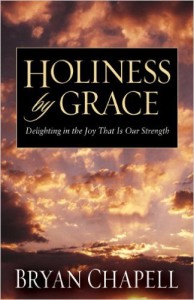 I just finished my second reading of Holiness by Grace; this time around, it included a small group discussion. I regard Holiness by Grace as one of the better books on sanctification that I’ve read. Before a reader even makes it to the introduction, she comes across a who’s who of distinguished endorsements from the Reformed Evangelical community: Packer, Kennedy, Brown, Ferguson, Keller, Carson, Ryken, Bridges, etc. The book lives up to the endorsements.
I just finished my second reading of Holiness by Grace; this time around, it included a small group discussion. I regard Holiness by Grace as one of the better books on sanctification that I’ve read. Before a reader even makes it to the introduction, she comes across a who’s who of distinguished endorsements from the Reformed Evangelical community: Packer, Kennedy, Brown, Ferguson, Keller, Carson, Ryken, Bridges, etc. The book lives up to the endorsements.
Seeking to understand how grace operates in the Christian life, Holiness by Grace rejects the two extremes of legalism and lawlessness (antinomianism). Early on in the book Chapell notes, “Legalism makes believers think that God accepts them on the basis of what they do. Licentiousness makes believers think that God does not care what they do. Both errors have terrible consequences.” (p. 12) The rest of the book is dedicated to unpacking these ideas.
Those who read Holiness by Grace will soon discover why I call Chapell “a pastor’s pastor.” In the world of pastoral ministry, there are those among us who are good theologians and those among us with good communication skills. Both of these gifts come together in this book